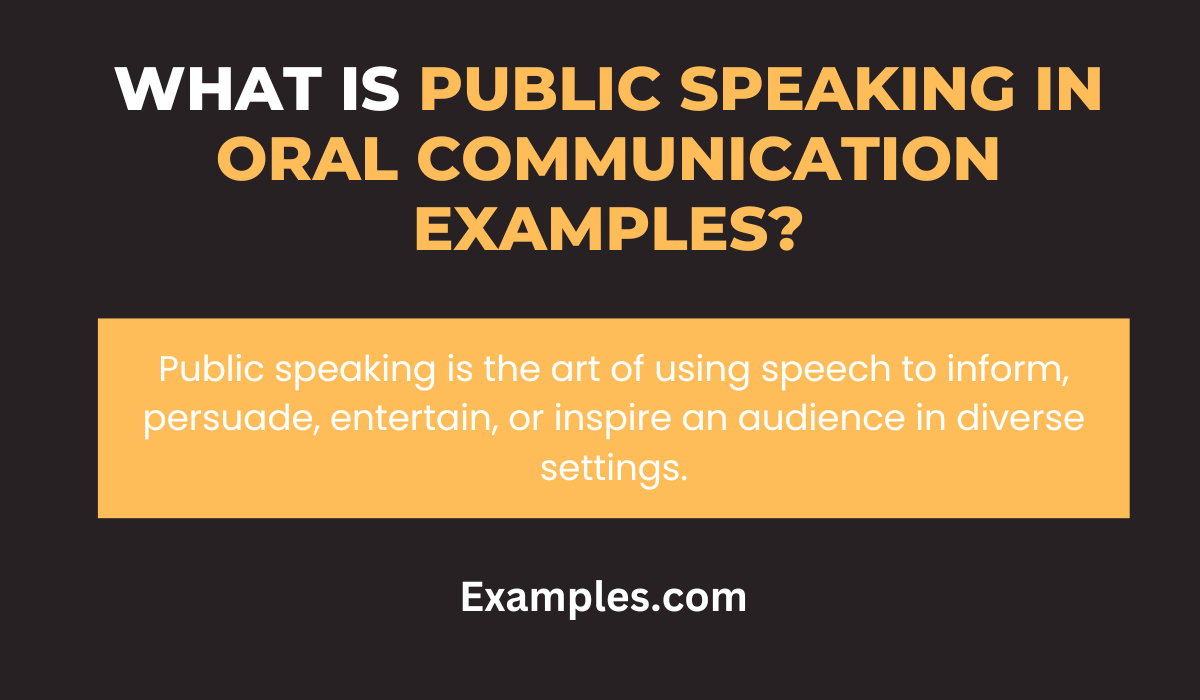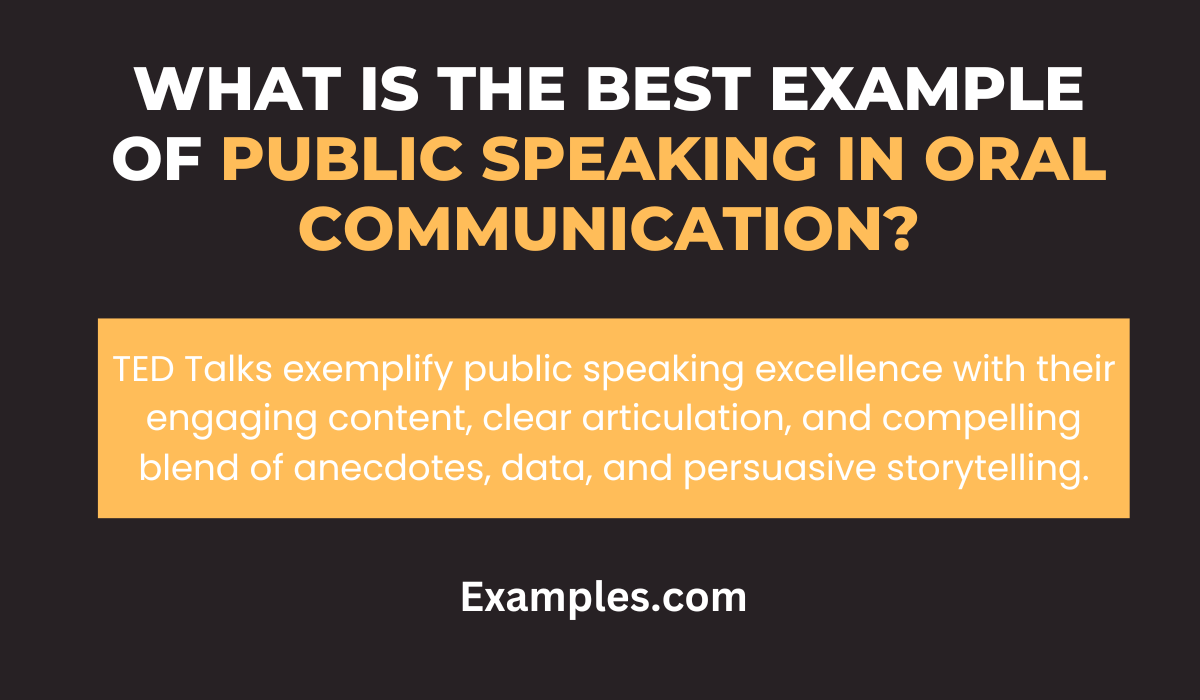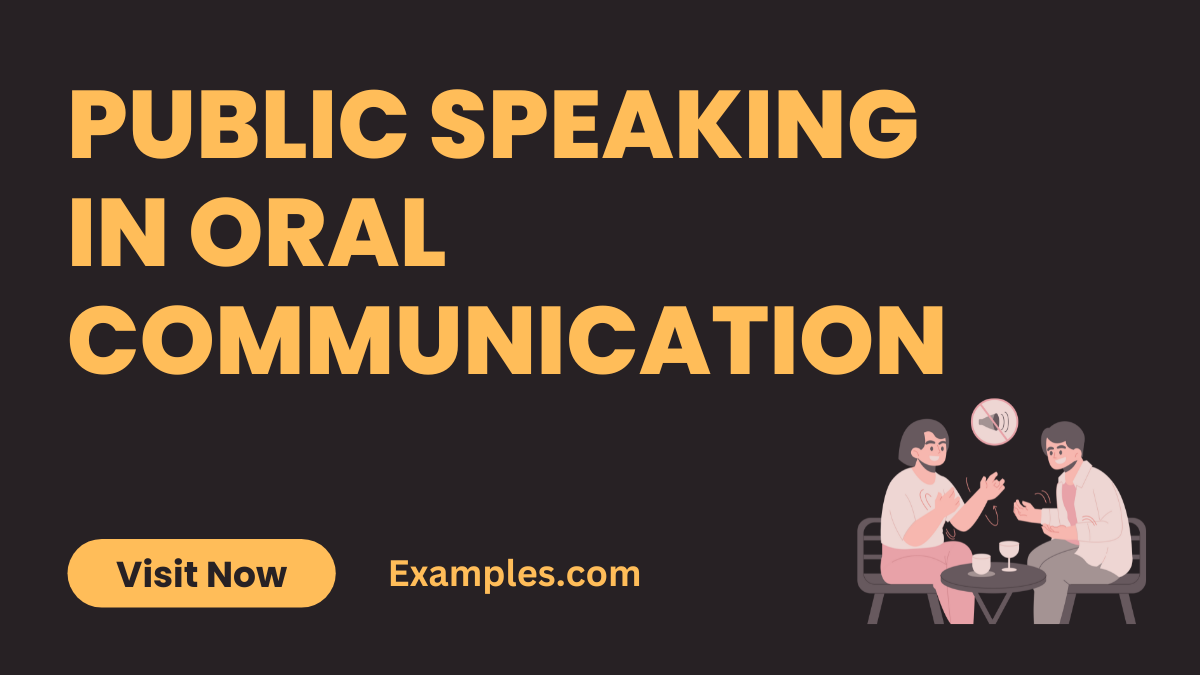29+ Public speaking in Oral Communication Examples
In today’s fast-paced world, mastering public speaking is more crucial than ever. This comprehensive guide delves into various public speaking in oral communication examples, showcasing the art of effectively conveying ideas and information. It illuminates the nuances of successful speaking, from persuasive pitches to motivational speeches, all while integrating essential communication examples. Whether for professional growth or personal development, this guide is an invaluable resource for enhancing your communication skills and elevating your public speaking abilities.
What is Public Speaking in Oral Communication Examples?

Public speaking in oral communication refers to the process of conveying a message or information to an audience through speech. This form of communication ranges from formal presentations and speeches to informal talks and discussions. Examples of public speaking in oral communication include delivering a keynote address at a conference, presenting a business proposal, teaching a class, or even speaking at a community event. The key is the spoken word’s power to inform, persuade, entertain, or inspire the audience.
What is the Best Example of Public Speaking in Oral Communication?

One of the best examples of public speaking in oral communication is a TED Talk. TED Talks are renowned for their engaging, informative, and often inspiring content. They exemplify effective public speaking by combining clear articulation, compelling storytelling, and the strategic use of visual aids. Speakers in TED Talks often utilize a blend of personal anecdotes, scientific data, and persuasive rhetoric to connect with their audience on an intellectual and emotional level. This format demonstrates the power of oral communication in captivating and influencing an audience.
30 Public Speaking in Oral Communication Examples
Public speaking is a vital aspect of effective communication, where mastery in verbal communication and nonverbal communication is showcased. In this segment, we explore 30 unique examples of public speaking in oral communication, each accompanied by a brief explanation and a bold example sentence. These examples span various contexts, from business communication to educational settings, demonstrating the versatility and impact of skillful oral communication. Whether it’s a leadership communication scenario or an interpersonal communication setting, these examples highlight the nuances of assertive communication and the power of the spoken word in different environments.
- Business Presentation: Delivering a quarterly report to stakeholders.
“This quarter, our team has exceeded targets, reflecting our strong commitment to innovation and efficiency.”

- Keynote Speech: Speaking at a technology conference.
“In the realm of artificial intelligence, we are not just building machines; we are cultivating a future.” - Academic Lecture: Educating students about climate change.
“Climate change isn’t just a theory; it’s our reality, and it requires our immediate action.” - Motivational Talk: Addressing a group of young entrepreneurs.
“The path to success is not linear; it’s paved with challenges, learning, and resilience.” - TEDx Talk: Sharing innovative ideas in a community event.
“Today, I want to unveil a concept that could revolutionize the way we think about renewable energy.” - Sales Pitch: Introducing a new product to potential clients.
“Our latest product isn’t just an item; it’s a solution to your everyday challenges.” - Political Speech: Campaigning for environmental policies.
“We stand at a crossroads – one path leads to a sustainable future, the other to irreversible damage.”

- Toast at a Wedding: Celebrating the couple’s new journey.
“Today, we raise our glasses to a lifetime of love, laughter, and shared dreams.” - Legal Argument: Presenting a case in court.
“The evidence clearly shows that my client’s actions were in self-defense.” - Public Service Announcement: Raising awareness about health and safety.
“Remember, wearing a mask saves lives – yours and others.” - Community Forum Speech: Discussing local development plans.
“This development isn’t just about buildings; it’s about building our community’s future.” - Scientific Presentation: Explaining a new research finding.
“Our study reveals a groundbreaking approach to combating this disease.” - Inspirational Speech: Speaking to a charity event audience.
“Every small act of kindness creates ripples of positive change in the world.” - Conference Panel Discussion: Discussing trends in digital marketing.
“In digital marketing, it’s not just about reaching audiences; it’s about engaging them meaningfully.” - University Commencement Address: Inspiring graduates as they embark on new journeys.
“As you step into a new chapter, remember that your education is a tool for transformation.” - Eulogy: Honoring the life of a loved one.
“In remembering [Name], we celebrate a life filled with love, laughter, and lasting impact.” - Startup Pitch: Convincing investors to fund a new venture.
“Our startup offers more than a product; we offer a vision for a smarter future.” - Workshop Training: Teaching effective communication skills in the workplace.
“Effective communication is not just about speaking; it’s about being heard and understood.”

- Religious Sermon: Delivering a message of faith and hope.
“In times of uncertainty, our faith guides us towards light and truth.” - Radio Broadcast: Discussing current events and their implications.
“Today’s topic delves into how recent policies will shape our economic landscape.” - Book Reading: An author reading excerpts from their latest novel.
“As I read, let each word transport you into the heart of the story.” - Health Seminar: Educating the public about nutrition and wellness.
“Good health is more than diet and exercise; it’s a lifestyle of mindful choices.” - Debate Competition: Arguing a point in an academic debate.
“My argument clearly demonstrates why this policy will benefit society as a whole.” - Corporate Training Session: Teaching internal communication strategies.
“Effective internal communication is the backbone of a successful organization.” - Press Conference: Addressing the media on a critical issue.
“Today, we address concerns with transparency and a commitment to solutions.” - Fundraising Event Speech: Encouraging donations for a cause.
“Your contribution today makes a tangible difference in the lives of those in need.” - Award Acceptance Speech: Expressing gratitude upon receiving an award.
“This award is not just a personal achievement; it’s a recognition of collective effort.” - City Council Meeting: Proposing a new community initiative.
“Our proposal aims to enhance the quality of life for all our residents.” - Emergency Broadcast: Providing critical information during a crisis.
“In this emergency, staying informed and prepared is our top priority.” - Therapeutic Session: A counselor speaking to a client.
“In our sessions, your thoughts and feelings are not just heard; they are valued.”
These examples illustrate the diverse range of scenarios where public speaking in oral communication plays a pivotal role. Each instance highlights how effective communication can influence, inform, and inspire, demonstrating the profound impact of well-delivered speeches and presentations in various contexts.
What is the Importance of Public Speaking in Oral Communication?
Public speaking is a critical component of oral communication, with its importance sprawling across various spheres:
- Enhances Persuasive Power: Public speaking equips individuals with the ability to persuade and influence, key in fields like politics, business, and non-profit endeavors.
- Boosts Confidence: Regular engagement in public speaking builds self-confidence, crucial for personal and professional growth.
- Facilitates Clear Messaging: It hones the ability to convey messages clearly and concisely, an essential aspect of effective communication.
- Improves Interpersonal Skills: Public speaking is intertwined with interpersonal communication, enhancing one’s ability to interact with others effectively.
- Career Advancement: In the professional sphere, strong public speaking skills are often linked with leadership abilities, opening doors to career advancement.
- Educational Benefits: For students and educators, public speaking aids in the teaching and learning process, making education more engaging and effective.
Examples of Public Speaking in Oral Communication for Students
For students, public speaking in oral communication manifests in numerous ways, enhancing their educational experience and preparing them for future challenges:
- Classroom Presentations: Students often engage in presentations, where they learn to articulate ideas clearly and confidently.
- Debate Competitions: Participating in debates helps students develop critical thinking and argumentative skills.
- Group Projects: Collaborative projects require students to communicate effectively, fostering teamwork and leadership communication skills.
- Speech Competitions: Such events allow students to practice and showcase their oratory skills in a competitive and encouraging environment.
- Peer Tutoring: Engaging in tutoring sessions helps students learn to convey complex concepts in understandable terms.
- Academic Conferences: Attending or participating in conferences exposes students to professional levels of public speaking and networking.
How to Improve Public Speaking in Oral Communication?
Improving public speaking skills in oral communication involves a combination of practice, feedback, and learning:
- Practice Regularly: Consistent practice is key to gaining confidence and improving fluency.
- Seek Constructive Feedback: Regular feedback from peers, mentors, or coaches can help identify areas for improvement.
- Understand Your Audience: Tailoring your speech to the audience’s interests and level of understanding enhances engagement.
- Work on Nonverbal Communication: Effective use of body language, facial expressions, and tone can significantly enhance the impact of your speech.
- Learn from Experts: Watching and analyzing speeches by skilled orators can provide valuable insights.
- Join Speaking Clubs: Organizations like Toastmasters provide a supportive environment for practicing and improving public speaking skills.
Role of Public Speaking in Oral Communication
The role of public speaking in oral communication is vast and varied, impacting several aspects of life and work:
- Educational Tool: In educational settings, it is used to teach, inform, and engage students.
- Professional Development: In the workplace, it serves as a medium for pitching ideas, leading meetings, and facilitating internal communication.
- Community Engagement: Public speaking is crucial in community forums, local government, and social movements for awareness and advocacy.
- Cultural Exchange: It plays a role in intercultural communication, bridging gaps between different cultures through shared ideas.
- Media and Entertainment: Public speaking is fundamental in the media, from news broadcasting to entertainment, shaping public opinion and culture.
- Personal Growth: On a personal level, it aids in self-expression and personal development, building confidence and social skills.
Public speaking in oral communication is a pivotal skill that enhances personal, academic, and professional life. This guide has explored its significance, practical examples, improvement strategies, and varied roles, providing a comprehensive understanding. Embracing and honing these skills can lead to more effective communication, greater confidence, and numerous opportunities for growth and success in diverse aspects of life.
For further enrichment in public speaking and communication, readers can explore resources like Harvard University’s “Public Speaking” free course, which offers valuable insights into effective communication techniques and strategies (Harvard University). Additionally, the Toastmasters International website provides a wealth of information and tools to aid in honing public speaking skills, including tips, educational materials, and opportunities to practice in a supportive environment (Toastmasters International). These external resources complement the knowledge gained from this guide, offering practical ways to apply and enhance your public speaking abilities in real-world scenarios.



